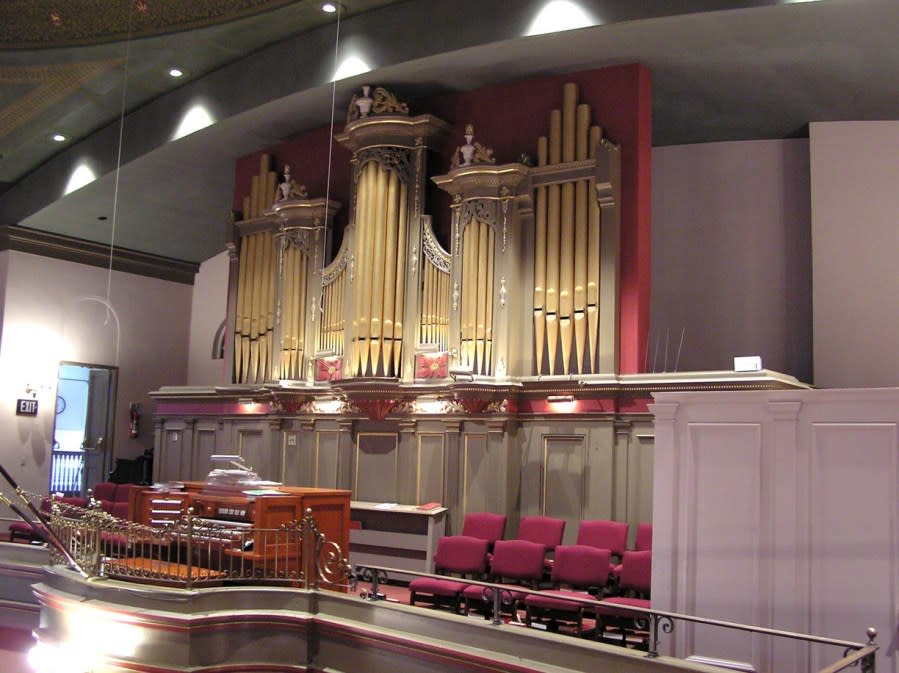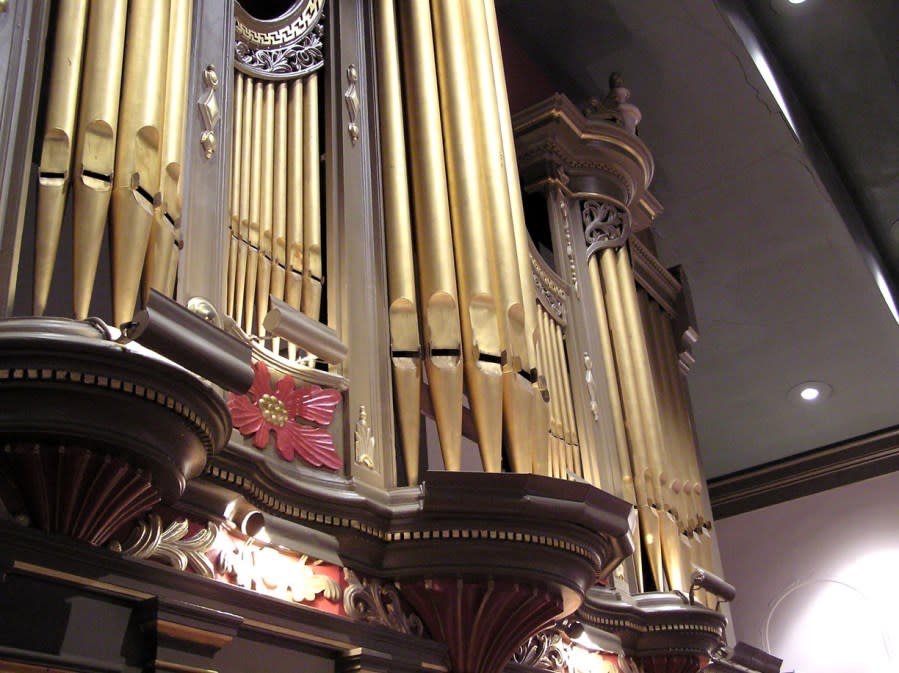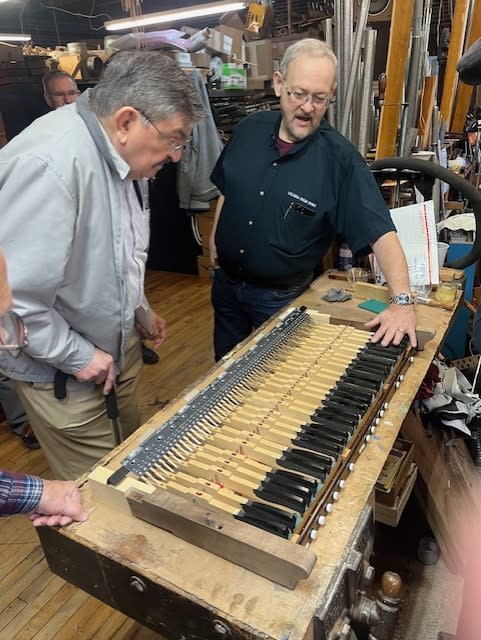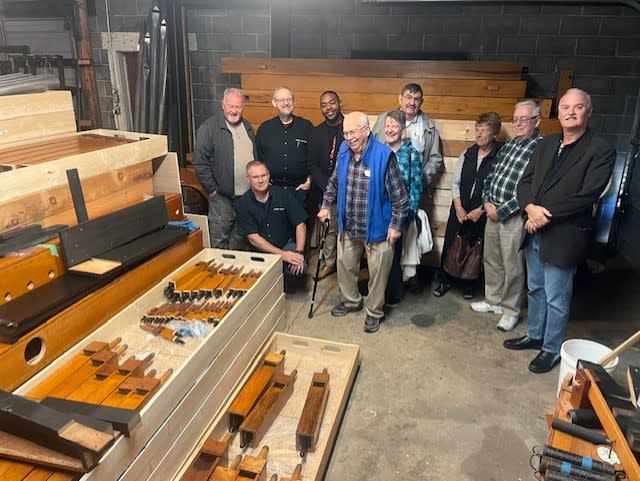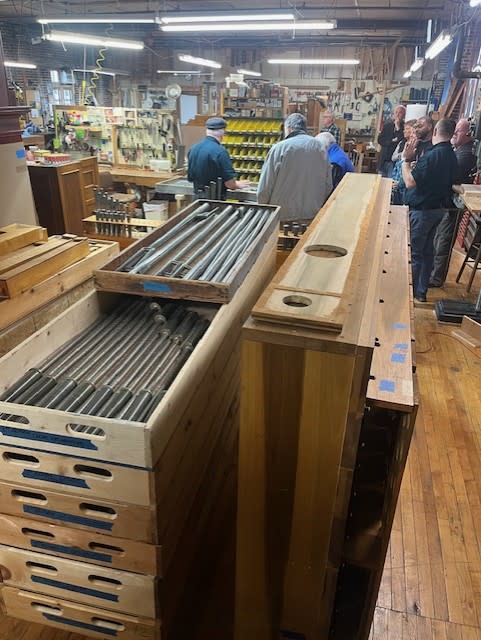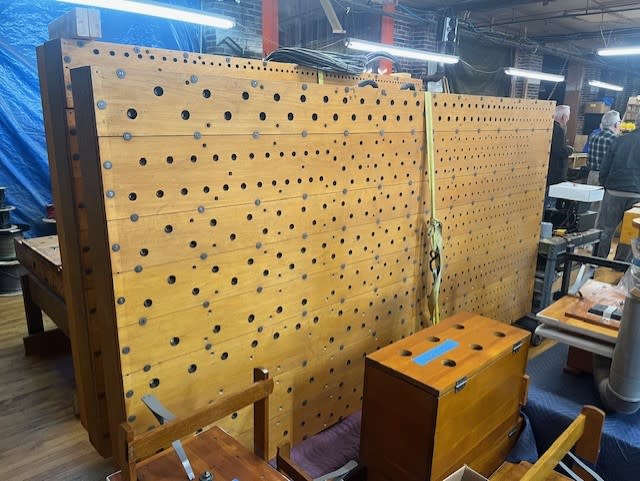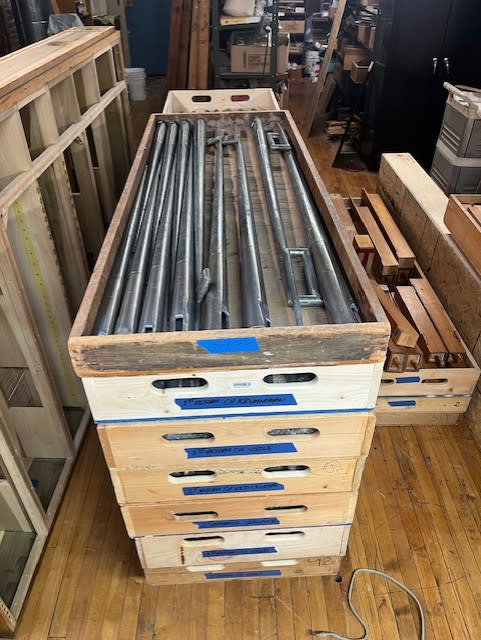Mighty to majestic: Lancaster church bids farewell to 1950s analog organ, newly restored pipe organ to be installed

- Oops!Something went wrong.Please try again later.
LANCASTER, Pa. (WHTM) — The first time John Hill Byrne learned that the First Reformed Church of Lancaster was replacing its old 1958 analog Allen organ was through a brochure. Later, he attended one of the church’s monthly first Friday concerts and heard the organ play.
15 minutes into that concert he knew he had to do something to help.
The church’s organ is special to him for a few reasons. Not only is he a long-time lover of organ music, but he was actually there in 1958 to see the analog organ installed.
“It’s a small world, it’s a really small world,” he said. “I would have been in high school then and for whatever reason I stopped down and watched them installing the organ.”
In addition to his memories and desire to help the church, Hill Byrne also wanted to help fund the organ to remember his mother who was very engaged with the church along with the rest of her family.
Hill Byrne is among many community members with memories attached to the organ. He is also one of the many donors who have contributed to help replace the church’s organ, a community project that has raised $240,000.
Thanks for signing up!
Watch for us in your inbox.
Subscribe Now
WHTM Daily Digest
The church’s original organ was first built in the 1700s by Moravian organ builder David Tannenberg. That instrument has since been replaced several times, but the facade of Tannenberg’s work still encases the church’s organ in the church today.
The case of David Tannenberg’s original work still sits around the organ in the First Reformed Church of Lancaster today. (Photo: First Reformed Church of Lancaster) The case of David Tannenberg’s original work still sits around the organ in the First Reformed Church of Lancaster today. (Photo: First Reformed Church of Lancaster)
The analog organ, that is currently behind the facade, was installed in 1958. At the time, it was the latest technology and was expected to have a lifespan of about 50 years. It was first dedicated in a concert by famous American organist and virtuoso Virgil Fox, and it has since been played constantly in services, concerts, weddings, funerals, and more.
Now that the organ is over a decade past its lifespan, it is showing signs of its age; it has fallen into disrepair with many parts broken, and some aren’t replaceable.
“Right now it’s in very poor condition,” the church’s organist Larry Hershey said. “There are many notes that are working. I push that button and couplers that connect each keyboard, they don’t work. So I’m often, pushing something, not knowing what’s going to happen… It’s literally falling apart.”
That’s why the church made the decision to undergo the long process of removing the organ and replacing it.
The church’s new organ, which will be named The Rita Jane (Barton) Hill Byrne and The Rev. Dr. Ronald Christiansen Memorial Organ, will be installed over the next few months. It is a pipe organ that was previously at the St. John’s United Church of Christ in Lebanon.
That church has since closed down.
The pipe organ, which was newly restored and enhanced in Lancaster County at Columbia Organ Works, is a welcomed upgrade to the First Reformed Church of Lancaster.
Columbia Organ Works President, Larry Pruett (right) shows progress on the restoration to John Hill Byrne (left). (Photo: First Reformed Church of Lancaster) Left to right: Rick Weinhold, Ken Krause, Larry Pruett, Pastor Devin Jeffers, Bill Sloyer, Anna Hill Byrne, John Hill Byrne, Phyllis Clelan, David Ferster and Larry Hershey. (Photo: First Reformed Church of Lancaster) The pipe organ restoration was done at Lancaster County’s Columbia Organ Works. (Photo: First Reformed Church of Lancaster) The pipe organ restoration was done at Lancaster County’s Columbia Organ Works. (Photo: First Reformed Church of Lancaster) The pipe organ restoration was done at Lancaster County’s Columbia Organ Works. (Photo: First Reformed Church of Lancaster)
“The old organ was mighty. I think the new organ will be majestic. I think the sounds that it creates will just be majestic and really assist in leading the service, assist in helping the congregation to lift our voices, and I think the community will be excited to hear what Larry will do with it,” Rick Weinhold, a volunteer who helps promote the church’s monthly first Friday concerts said.
Hershey is looking forward most to the music. That’s because while the analog organ produces a digital recording, the pipe organ creates its own original sound.
“For me, the most exciting thing is that it’s a real instrument that we’re getting,” Hershey said. “In other words, an analog organ is an imitation sound. A pipe organ, each node is handmade…the wind goes through it, whether it’s a metal or wood, and that is the real sound.”
Hershey says this type of pipe organ will also be a more historically appropriate choice to sit in the old Tannenberg case.
In addition to being excited about how its sound is made, he is also excited about what sounds the pipe organ will make. While the old Allen’s system was only able to store four memories, the enhanced pipe organ will be able to store 12.
“I have many pieces that I want to play, things that I’ve learned in college that I haven’t done because they just don’t work on the Allen,” Hershey said. “And now I will have this whole wealth of memories that I can use and yeah, it’s just exciting for me. It’s like starting over actually.”
Thanks for signing up!
Watch for us in your inbox.
Subscribe Now
This Week in Pennsylvania
But before it is time to start over and welcome the pipe organ, the church will first say goodbye to the old analog organ by hosting a concert to allow the community to hear its music for a final time.
The free, 30-minute concert will be held tonight, Friday, January 5, beginning at 8 p.m. at the church.
To honor the analog’s years of service, Hershey has selected a repertoire of church favorites and pieces that the old instrument is still able to play.
The first half of the concert will be a joyous celebration of the organ showing off all that it can do. It will include pieces like “Finale Jubilante” by Healey Willan and “Twas in the Moon of Wintertime” by Denis Bedard.
The tone of the second half will be darker, honoring the analog’s years of service before its retirement. It will feature “Funeral March” by Frederic Chopin and close with the famous “Toccata” from Organ Symphony No. 5 by Charles Marie Widor.
The most special part of the concert will be a Bach piece arranged by Virgil Fox.
“We’re notating Virgil Fox, who played this dedicatory cital back on April 7, 1958, when the Allen went in and I was told it was a packed house,” Hershey said.
After the concert is over, the old organ will be removed next week.
Even though the analog’s time at the church is ending, it will not go completely to waste.
“There is a company that continues to service old analog organs who will take as many parts as they can from it that are still working, and use those to help keep other instruments alive,” Weinhold said. “So it’s kind of becoming a donor. An organ donor.”
For the latest news, weather, sports, and streaming video, head to ABC27.
